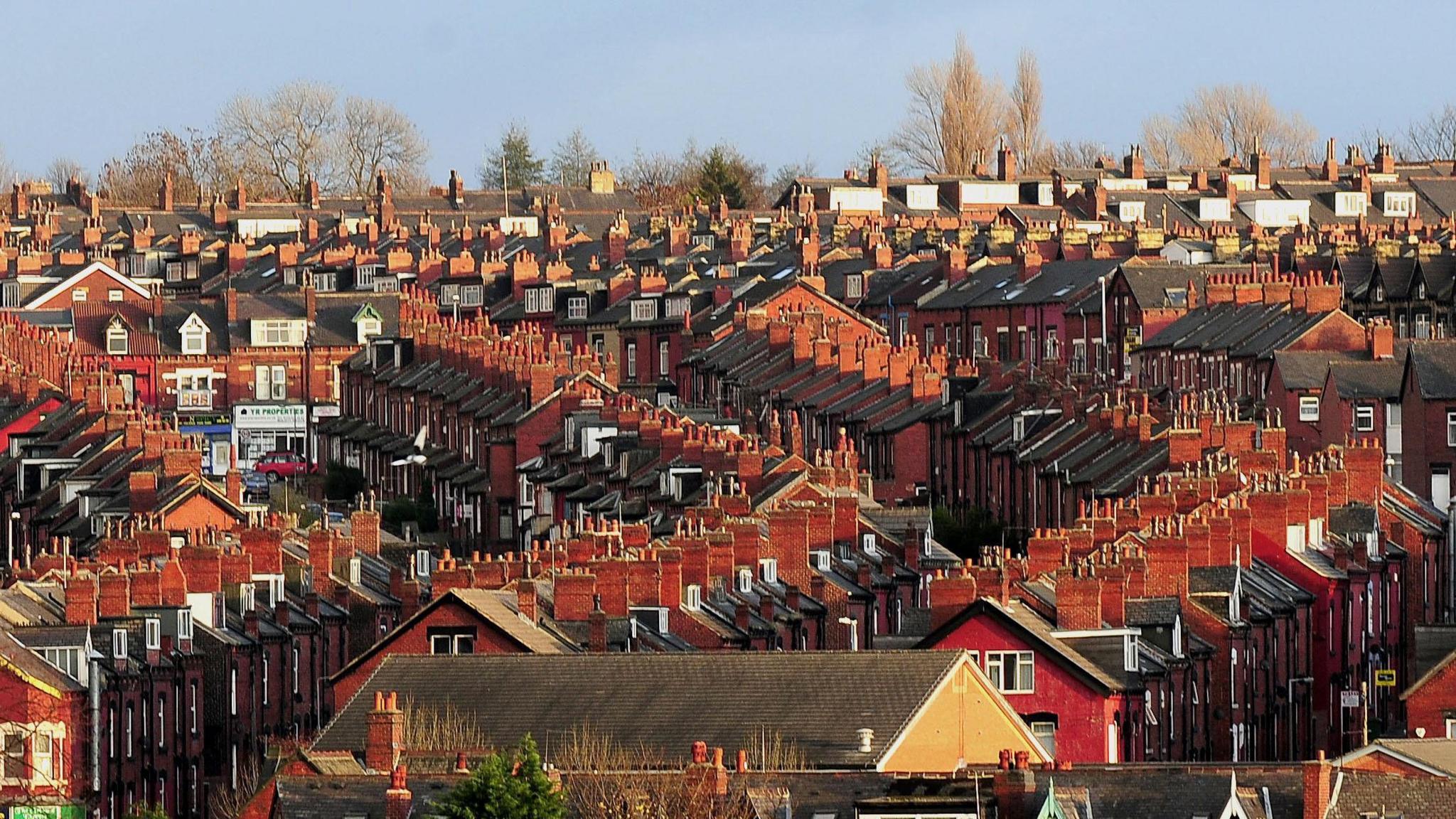Public frustrated by asylum seeker housing - minister

- Published
The government shares the public's "huge frustration" at the pressure the asylum system puts on housing supply, Business Secretary Jonathan Reynolds has said.
Speaking to the BBC, he acknowledged concern about the Home Office competing with local councils to find temporary homes for asylum seekers and homeless people respectively.
He said the solution lay in building more homes, processing asylum applications faster, removing those with no right to be in the UK and cutting small boat crossings.
Earlier this week, the Conservatives criticised Sir Keir Starmer for claiming there was "lots of housing in many local authorities" to provide temporary accommodation for homeless families.
The Conservative's new shadow housing secretary Sir James Cleverly said the remarks had "amplified" the frustrations of people who were trying to get on the housing ladder.
The past week has seen ongoing demonstrations outside a hotel in Epping being used to house asylum seekers.
UK's asylum hotel bill down 30%, government says
- Published18 July
'I've moved seven times in three months'
- Published11 December 2024
The town hit by divisive protests over asylum seekers hotel
- Published22 July
The prime minister made the remark when appearing at the Liaison Committee, a group of senior MPs.
Labour MP Dame Meg Hillier, who chairs the Treasury Committee, asked the prime minister where the government was going to house homeless people, given that the price of temporary accommodation had been driven up by the need to house asylum seekers.
He replied: "Oh, there is lots of housing and many local authorities that can be used, and we're identifying where it can be used."
Pressed for specific examples, Sir Keir said he would write to the committee.
Asked about the comments on the Today programme, Reynolds said the prime minister "was talking about, in lengthy way, we need to put more in place to solve the housing crisis.
"We're doing that and there are several options that can be considered for British families in temporary accommodation."
Speaking to the same programme, chair of the Housing Committee Florence Eshalomi said councils were "at breaking point when it comes to housing supply".
She said her committee had been told that between 2023- 2024, local councils had spent a total of £2.3bn on temporary accommodation and that the numbers in temporary accommodation had risen by 11% in the past year.
Asked about the Sir Keir's comments, she said she would "welcome seeing the detail the prime minister was alluding to".
She said it "cannot be right" that the Home Office and local authorities were having to compete for the same accommodation and that there needed to be better "co-operation" between government departments.
She also said more social housing - housing that can be rented at affordable levels - needed to be built in order to ease the pressures.
Councillor Hannah Dalton, from the District Councils' Network, said: "The reality for district councils is that our spending on temporary accommodation has increased by more than 200% over three years and waiting lists have risen to 303,000 households.
The leader of Epsom and Ewell Borough Council, from the Residents' Association party, added: "Rather than councils and the Home Office competing for the same limited stock, we need urgent action to prevent homelessness in the first place, including uprating housing benefit rates which have been frozen this year despite rising private rents."
Councils fear bankruptcy amid homelessness crisis
- Published24 April
Why do Channel migrants want to come to the UK?
- Published9 July
'On my budget I could only rent a parking space'
- Published22 July
Figures released earlier this year found that a record 123,000 families were living in temporary housing in England.
Temporary accommodation refers to accommodation which is organised by the local authority but is not a permanent home. It can include hotels, hostels or caravans.
It is provided to those who are homeless, while they wait for longer term housing. Priority is given to people at risk of abuse from a partner or relative, pregnant women, people with dependent children or those who are homeless because of a fire or flood.
Separately, the government is required by law to provide accommodation to destitute asylum seekers, while their application is being processed. In general asylum seekers are not allowed to work and earn money until their claim has been completed, although there are some exceptions.
Since 2020, there has been an increased in using hotels to provide this accommodation.
As of March 2025, there were 32,345 people in asylum hotels, up from 29,585 at the end of June 2024, but lower than the total in December.
The Home Office's annual accounts show a third less was spent on hotels to house asylum seekers between April 2024 and March 2025, falling from £3bn to £2.1bn.
A senior Home Office source told the BBC one of the main factors behind the saving was moving some asylum seekers from hotels into other types of cheaper accommodation.
They said the department had prioritised moving families and children into regular housing so they were not living in hotels for long periods of time.
The government has said it wants to end the use of hotels to house asylum seekers altogether and Reynolds told the BBC the number of hotels being used had fallen from a peak of 400 to 200.
However, he added: "The solution is not about putting people into different forms of accommodation
"It's about having a system where if people shouldn't be in the UK they have to leave the UK.
"That is government policy... it is about having a system that processes the claims at the pace they should be processed and doesn't leave people in limbo."